Impish behaviour at Lincoln City FC
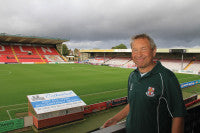
In football, two of the hardest leagues to get promotion from are the Championship and the Conference, with both offering large financial incentives to those who succeed.
Lincoln City Football Club are one such club who are struggling to return to league status following relegation to the Conference in season 2010-11. This after five unsuccessful attempts to reach Football League One via the play-offs during the noughties.
Lincoln's claim to fame is that they are one of the longest serving league club never to reach the top flight at any stage in their history, which stretches back to the late 19th century.
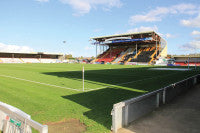
However, the club are acutely aware that a return to league status would see that figure rise considerably, bringing with it significant financial benefits.
Sincil Bank is an all-seater stadium with a capacity of over 10,000 and is split into five distinct areas - the Lincolnshire Co-operative Stand, the St Andrews/Lincolnshire Echo Stand, the Bridge McFarland Stand, the Visitors Stand and the Stacey West Stand, named after two unfortunate souls - Bill Stacey and Jim West - who lost their lives in the fire at Bradford City when Lincoln City were the opposition.
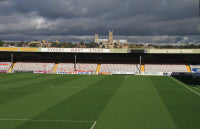
As with many clubs at this level, multi tasking due to financial constraints is the norm. No more is this evident than with their present Head Groundsman, Phil Kime, a lifelong fan of 'The Imps' who spent nine years helping out at the club as a volunteer, undertaking such duties as videoing the matches and working on the grounds, before finally being offered the full time paid position of head groundsman five years ago.
Phil confesses that he learned a lot from the previous head groundsman, Mark Reeve, and stadium manager, Nigel Dennis, before taking on the role.
Phil has an assistant, Paul Ash, who joined the club as an apprentice before being offered a permanent position. Between them they share a significant role in looking after the pitch, stands, changing rooms and toilets.
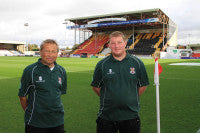
Paul is currently undertaking NVQ level three at Riseholme College and, says Phil, has settled in really quickly at the club and enjoys the skills he is learning; "he his very keen to get on and make something of himself in the sportsturf industry," comments Phil.
Match days tend to be the busiest day of the week, with Saturday games requiring a 7.00am start to get everything ready - mowing and marking out, watering the pitch and getting the kit ready, along with other duties that include inspecting and opening the ground and ensuring the toilets are clean and ready for use.
Marking out is done using a transfer wheel linemarker, in both directions to get a bright line.
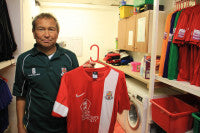
On Monday, the duo will be back at the ground to divot the pitch and run the rotary mowers over the surface. The afternoon will be spent cleaning up the stands and litter picking. Throughout the week they will alternate working on the pitch with their other duties.
There is also a 3G artificial pitch to maintain that runs adjacent the stadium pitch. Maintenance is limited to sweeping and brushing two or three times a week along with regular litter picking.
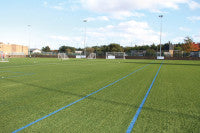
The stadium pitch is a typical soil based construction with primary drainage at five metre centres and sand bands running at one metre centres. Over the years the surface has had repeated topdressings of 70/30 rootzone to improve the soil profile, reinstate levels and enhance surface infiltration.
End of season renovations are carried out by a local contractor, with any agronomy advice provided by Duncan Beall, who has helped the club for many years, along with many other sports clubs in Lincolnshire.
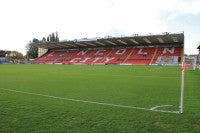
The pitch has a fully automated pop-up watering system - fourteen perimeter and six infield pop-ups - fed by the mains, that facilitates pre-match and halftime watering.
Phil's feeding regime is centred on a simple spring, summer and autumn granular programme plus some liquid iron to maintain colour during winter.
The current manager, Gary Simpson, is keen to play a passing game of football on the floor, so he instructs Phil to keep the pitch on the short side, mowing daily and keeping it at a height around 25mm.
As with any stadium pitches, the stands do cause problems of shade during the winter months. The South Park area of the pitch sees little sun during the winter months leaving the south side goal area prone to damage. So, while soil temperatures are favourable for seed germination, Phil will constantly keep sowing seed on the worn areas and use germination sheets to aid quick germination.
Phil is hoping he can persuade the club to invest in a small goalmouth lighting rig to help with this, whilst a self-build project is also an option he is looking into.
"Having our own verti-drain means we can aerate as and when we like," continues Phil, "which we will try and do on a monthly basis, subject, of course, to the weather, fixtures and the condition of the pitch."
"Having no undersoil heating means that the only protection we have from frost are the dreaded frost sheets, which are always a hard slog to manage, especially with limited resources," bemoans Phil.
"There's plenty of optimism around this season," suggests Phil. "And there's plenty of pride around the place too. The team are responding well to the manager, and the aim is to at least make the play-offs with a chance to get the club back into League 2."
With the prospect of more derby matches leading to increased revenue, there's plenty of excitement around the city, with the belief that this could well be their season. Phil Kime is certainly doing his bit to help.
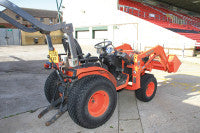
Allett Regal 42
Allett C34 with cylinder, verticut and scarification cartridges,
Hayter Harrier rotary mowers x 2
Kubota B2230 tractor
Charterhouse Verti-Drain 7212
Plus a sprayer, pedestrian spreaders and a brush
